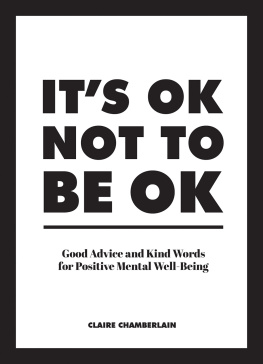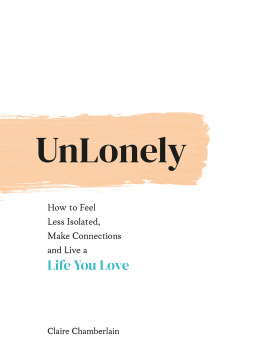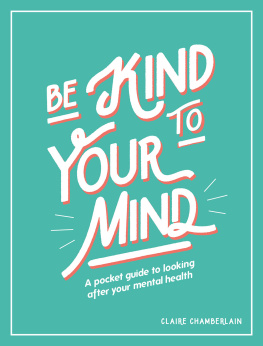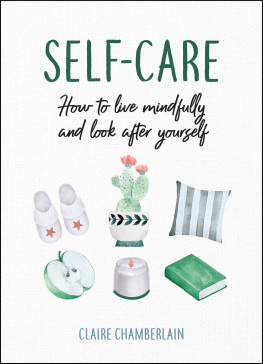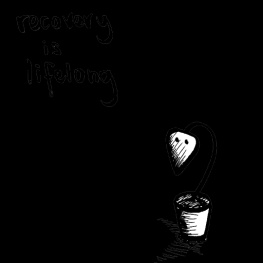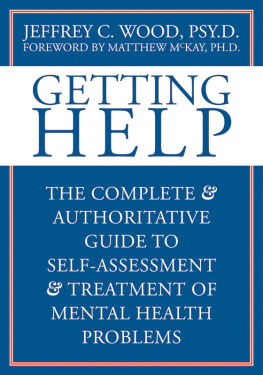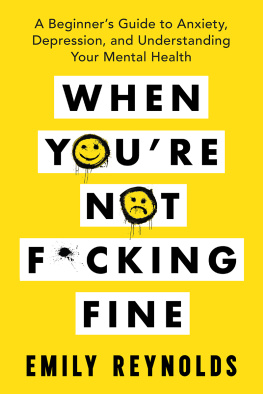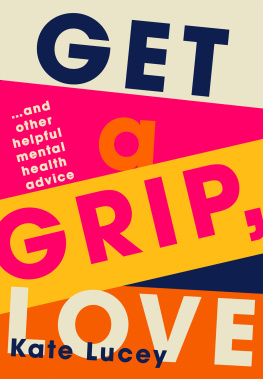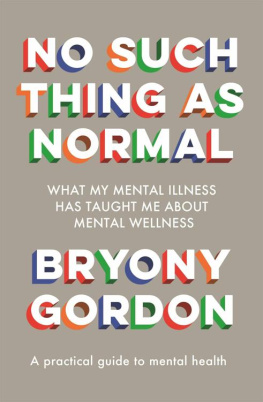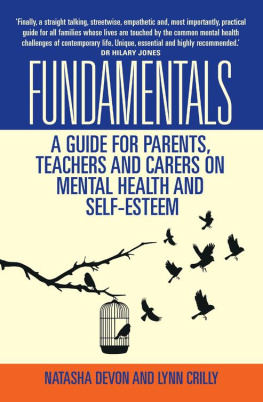ITS OK NOT TO BE OK
Copyright Summersdale Publishers Ltd, 2019
All rights reserved.
No part of this book may be reproduced by any means, nor transmitted, nor translated into a machine language, without the written permission of the publishers.
Claire Chamberlain has asserted her moral right to be identified as the author of this work in accordance with sections 77 and 78 of the Copyright, Designs and Patents Act 1988.
Condition of Sale
This book is sold subject to the condition that it shall not, by way of trade or otherwise, be lent, resold, hired out or otherwise circulated in any form of binding or cover other than that in which it is published and without a similar condition including this condition being imposed on the subsequent purchaser.
An Hachette UK Company
www.hachette.co.uk
Vie Books, an imprint of Summersdale Publishers Ltd
Part of Octopus Publishing Group Limited
Carmelite House
50 Victoria Embankment
LONDON
EC4Y 0DZ
UK
www.summersdale.com
eISBN: 978-1-78783-451-4
Substantial discounts on bulk quantities of Summersdale books are available to corporations, professional associations and other organizations. For details contact general enquiries: telephone: +44 (0) 1243 771107 or email: .
Disclaimer
The author and the publisher cannot accept responsibility for any misuse or misunderstanding of any information contained herein, or any loss, damage or injury, be it health, financial or otherwise, suffered by any individual or group acting upon or relying on information contained herein. None of the views or suggestions in this book is intended to replace medical opinion from a doctor who is familiar with your particular circumstances. If you have concerns about your health, please seek professional advice.
INTRODUCTION
No one is happy all the time. In fact, its perfectly normal to not feel OK sometimes. But whether youre just feeling a bit down, or you suspect it might be a more serious mental health problem, you should never feel like you have to go through a difficult period alone. As isolating as sadness, emptiness, anxiety or depression can feel, there are people who understand and care. This book is for anyone not feeling OK right now, for whatever reason. Its filled with practical tips and inspiring ideas to help you look after yourself when youre feeling low, as well as suggestions on where to find help if everything is getting too much, or you feel like you can no longer cope. I hope the following pages will help, and that they remind you that you are uniquely valuable even when you might not feel like it.
NOT UNTIL WE ARE LOST DO WE BEGIN TO UNDERSTAND
OURSELVES.
HENRY DAVID THOREAU
WHAT IS OK, ANYWAY?
If youve ever been asked how youre feeling and have simply replied, OK, without giving it much thought, you are certainly not alone. Its a reply thats uttered so frequently, its almost become an expected response. But what if, underneath the surface, you really dont feel OK? And whats more, what if you dont feel its OK to say youre not OK? Then take a deep breath and read on, because you are important and so is your mental health.
THE MENTAL HEALTH SPECTRUM
Mental health is something everybody has. It exists on a spectrum and, as with your physical health, it needs to be nurtured if its to be kept in good condition. Sometimes, however, you can do as much nurturing as you like, but you might still experience mental health difficulties. This can happen for a variety of reasons, from a sudden life event, to a hormonal imbalance, to an underlying mental health condition.
Experiencing a mental health problem can feel lonely, and you might think no one else has ever felt the way you do. But however isolated you might feel, its important to recognize that these feelings affect most people at some point in their lives the World Health Organization (WHO) states that one in four people will experience mental health difficulties at some stage. Its also perfectly normal to feel low or flat sometimes. But if your poor mental health is stopping you from living your life as you would wish for example, if youre struggling to get out of bed in the morning, or youre experiencing chronic anxiety its important to address the issue, to help ease your distress and stop it from escalating.
There is no standard normal. Normal is subjective. There are seven billion versions of normal on this planet.
MATT HAIG
YOU ARE NOT ON YOUR OWN.
Accept that you are perfectly imperfect
When youre struggling with your mental health, it can feel like an exhausting battle as you try to fight demons and wrestle negative emotions. So, if life is feeling hard, its time to take some gentle, positive action. The first step (which can be the hardest) is to accept yourself, in this moment, exactly as you are. You might feel low; you might be suffering with anxiety; you might be living with depression, or struggling with an addiction. But right now you are still a whole and necessary human being imperfections and all.
EMBRACE THE GLORIOUS MESS THAT YOU ARE.
ELIZABETH GILBERT
You deserve better
Freeing yourself from states of depression, stress, anxiety, sadness, poor mood or low self-worth is hard. Living with any of the above (or any other mental health condition) can make you feel helpless, and the longer it goes on, the less you might feel that you deserve happiness, contentment or love. However, feeling undeserving can create unconscious resistance to growth and positive change. This means that, no matter how much you want things to change, you might get stuck in a cycle of self-sabotage. It may seem tough, but in order to move forwards and create a more positive, nurturing mindset, you need to forgive yourself. Yes, there may be pain in your past be it loss, trauma, shame, regret or anger but in order to allow yourself to move on, you now need to be gentle with yourself. View yourself through a more compassionate lens: you are human, and humans experience pain and make mistakes. By forgiving yourself for past actions, thoughts and emotions you make room for empowering and positive change.
You are enough. Always.
UNDERSTANDING MENTAL HEALTH ISSUES
Mental health problems affect one in four adults at some point in their lives, so rest assured that if youre struggling right now, you are not alone, even if that is how you feel. Its a sad fact that many people suffer in silence, because of the perceived stigma surrounding mental health issues. But whatever thoughts, feelings, emotions or behaviours you are experiencing, trust in the fact that you are not weird or different. You are a normal person coping with a challenging condition and you are stronger than you know.
What causes mental health problems?
Poor mental health can have a wide range of causes; for many people, there is often more than one trigger. Mental health problems may be related to any number of factors, including childhood trauma, loss or bereavement, redundancy or unemployment, financial worries, loneliness or social isolation, living with a chronic physical illness, experiencing trauma as an adult, being a carer for a loved one, or physical or genetic causes. Whatever the reason, there is no shame in your suffering, nor should you blame yourself for it and there are lots of ways to improve your mental well-being.
NEVER GIVE UP ON YOURSELF.
How are mental health problems diagnosed?

